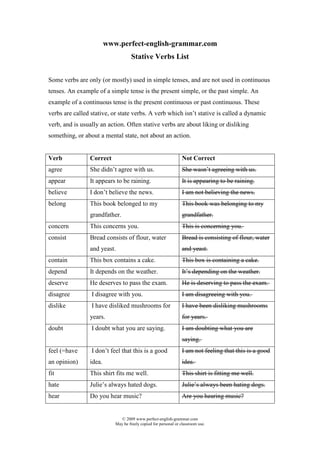
Stative verbs-list
- 1. © 2009 www.perfect-english-grammar.com May be freely copied for personal or classroom use. www.perfect-english-grammar.com Stative Verbs List Some verbs are only (or mostly) used in simple tenses, and are not used in continuous tenses. An example of a simple tense is the present simple, or the past simple. An example of a continuous tense is the present continuous or past continuous. These verbs are called stative, or state verbs. A verb which isn’t stative is called a dynamic verb, and is usually an action. Often stative verbs are about liking or disliking something, or about a mental state, not about an action. Verb Correct ot Correct agree She didn’t agree with us. She wasn’t agreeing with us. appear It appears to be raining. It is appearing to be raining. believe I don’t believe the news. I am not believing the news. belong This book belonged to my grandfather. This book was belonging to my grandfather. concern This concerns you. This is concerning you. consist Bread consists of flour, water and yeast. Bread is consisting of flour, water and yeast. contain This box contains a cake. This box is containing a cake. depend It depends on the weather. It’s depending on the weather. deserve He deserves to pass the exam. He is deserving to pass the exam. disagree I disagree with you. I am disagreeing with you. dislike I have disliked mushrooms for years. I have been disliking mushrooms for years. doubt I doubt what you are saying. I am doubting what you are saying. feel (=have an opinion) I don’t feel that this is a good idea. I am not feeling that this is a good idea. fit This shirt fits me well. This shirt is fitting me well. hate Julie’s always hated dogs. Julie’s always been hating dogs. hear Do you hear music? Are you hearing music?
- 2. © 2009 www.perfect-english-grammar.com May be freely copied for personal or classroom use. imagine I imagine you must be tired. I am imagining you must be tired. impress He impressed me with his story. He was impressing me with his story. include This cookbook includes a recipe for bread. This cookbook is including a recipe for bread. involve The job involves a lot of travelling. The job is involving a lot of travelling. know I’ve known Julie for ten years. I’ve been knowing Julie for ten years. like I like reading detective stories. I am liking reading detective stories. love I love chocolate. I’m loving chocolate.* matter It doesn’t matter. It isn’t mattering. mean ‘Enormous’ means ‘very big’. ‘Enormous’ is meaning ‘very big’. measure (=be long) This window measures 150cm. This window is measuring 150cm. mind She doesn’t mind the noise. She isn’t minding the noise. need At three o’clock yesterday I needed a taxi. At three o’clock yesterday I was needing a taxi. owe I owe you £20. I am owing you £20. own She owns two cars. She is owning two cars. prefer I prefer chocolate ice cream. I am preferring chocolate ice cream. promise I promise to help you tomorrow. I am promising to help you tomorrow. realise I didn’t realise the problem. I wasn’t realising the problem. recognise I didn’t recognise my old friend. I wasn’t recognising my old friend. remember He didn’t remember my name. He wasn’t remembering my name. seem The weather seems to be improving. The weather is seeming to be improving. sound Your idea sounds great. Your idea is sounding great. suppose I suppose John will be late. I’m supposing John will be late.
- 3. © 2009 www.perfect-english-grammar.com May be freely copied for personal or classroom use. surprise The noise surprised me. The noise was surprising me. understand I don’t understand this question. I’m not understanding this question. want I want to go to the cinema tonight. I am wanting to go to the cinema tonight. weigh (=have weight) This cake weighs 450g. This cake is weighing 450g. wish I wish I had studied more. I am wishing I had studied more. Some verbs can be both stative and dynamic: be be is usually a stative verb, but when it is used in the continuous it means ‘behaving’ or ‘acting’ you are stupid = it’s part of your personality you are being stupid = only now, not usually have have (stative) = own I have a car have (dynamic) = part of an expression I’m having a party / a picnic / a bath / a good time / a break see see (stative) = see with your eyes / understand I see what you mean I see her now, she’s just coming along the road see (dynamic) = meet / have a relationship with I’ve been seeing my boyfriend for three years I’m seeing Robert tomorrow taste (also: smell, feel, look) taste (stative) = has a certain taste This soup tastes great taste (dynamic) = the action of tasting The chef is tasting the soup think think (stative) = have an opinion I think that coffee is great think (dynamic) = consider, have in my head what are you thinking about? I’m thinking about my next holiday